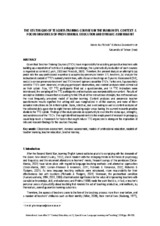The status quo of teacher-training courses in the Iranian EFL context: a focus on models of professional education and dynamic assessment
Autor
Rezaee, Abbas Ali
Ghanbarpour, Mahsa
Editor
Universidad de Córdoba, UCOPressFecha
2016Materia
Classroom assessmentDynamic assessment
Models of professional education
Models of teacher learning
Teacher education
Teacher-training
METS:
Mostrar el registro METSPREMIS:
Mostrar el registro PREMISMetadatos
Mostrar el registro completo del ítemResumen
Given that Teacher-Training Courses (TTC’s) have responsibility for assisting prospective teachers with
building up a repertoire of technical & pedagogic knowledge, the systematically evaluation of such courses
is regarded as seminal (Lynch, 2003 and Peacock, 2009). Therefore, the present study is an attempt to (a)
probe into the way professional expertise is acquired by preservice Iranian EFL teachers, (b) analyze the
instructional content of TTC’s currently held in Iran, with a focus on teachings on Dynamic Assessment (DA),
and (c) examine preservice teachers’ and TTC trainers’ opinions about the TTC’s. To this end, 9 purposefully
selected TTC’s were observed, employing participant observation, and content analyses were carried out
on their syllabi. Also, 107 TTC participants filled out a questionnaire, and 14 TTC instructors were
interviewed; the sampling of the TTC participants and instructors was nonprobability convenient. Results of
descriptive statistics showed that accounting for 84.73% of all the instructional attempts, the craft model was
the most frequently prevalent model of teacher learning. Content analyses and preservice teacher
questionnaire results signified that writing skill was marginalized in all the courses, and none of them
included instructions on DA in their syllabi. Open, selective, and axial coding as well as content analyses of
the collected data gave rise to eight themes delineating major areas fueling the current research-practice
divide in the TTC syllabi. Findings of the study provide an opportunity to examine the status quo, strengths,
and weaknesses of the TTC’s. The eight identified impediments to the employment of research in pedagogy
could help reach a framework for factors that might induce TTC organizers to disregard the implication of
relevant research findings for the courses they run.

